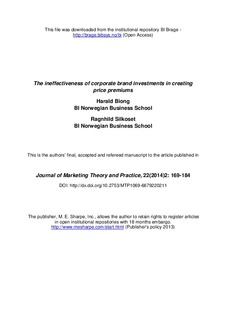| dc.contributor.author | Biong, Harald | |
| dc.contributor.author | Silkoset, Ragnhild | |
| dc.date.accessioned | 2014-06-13T11:11:28Z | |
| dc.date.available | 2014-06-13T11:11:28Z | |
| dc.date.issued | 2014 | |
| dc.identifier.citation | Journal of Marketing Theory and Practice, 22(2014)2: 169-184 | nb_NO |
| dc.identifier.issn | 1944-7175 | |
| dc.identifier.uri | http://hdl.handle.net/11250/196433 | |
| dc.description | This is the authors’ final, accepted and refereed manuscript to the article.
Publisher's homepage: http://www.mesharpe.com
Availability of author's version is delayed until 18 months after first online publication. Unavailable until 2015-11-01. Publisher's policy | nb_NO |
| dc.description.abstract | B2B branding research indicates that corporate brand equity investments will increase suppliers’ price premiums. In contrast, economics of information studies suggest suppliers’ price premiums to decrease with their brand investments. This study, building on economics of information, tests these contrasting perspectives empirically in a B2B-services context. The results show that suppliers’ corporate brand investments are ineffective in creating price premiums because brand investments and price premiums provide substituting information of unobservable quality. Furthermore, suppliers’ price premiums decrease with buyers’ willingness to punish sellers’ quality deception. In contrast, the suppliers’ price premiums increase with their provision of warranties and with their customers’ quality sensitiveness. | nb_NO |
| dc.language.iso | eng | nb_NO |
| dc.publisher | M. E. Sharpe, Inc | nb_NO |
| dc.title | The ineffectiveness of corporate brand investments in creating price premiums | nb_NO |
| dc.type | Journal article | nb_NO |
| dc.type | Peer reviewed | nb_NO |
| dc.source.pagenumber | 169-184 | nb_NO |
| dc.source.volume | 22 | nb_NO |
| dc.source.journal | Journal of Marketing Theory and Practice | nb_NO |
| dc.source.issue | 2 | nb_NO |
| dc.identifier.doi | 10.2753/MTP1069-6679220211 | |
| dc.description.localcode | 1, Forfatterversjon | nb_NO |
